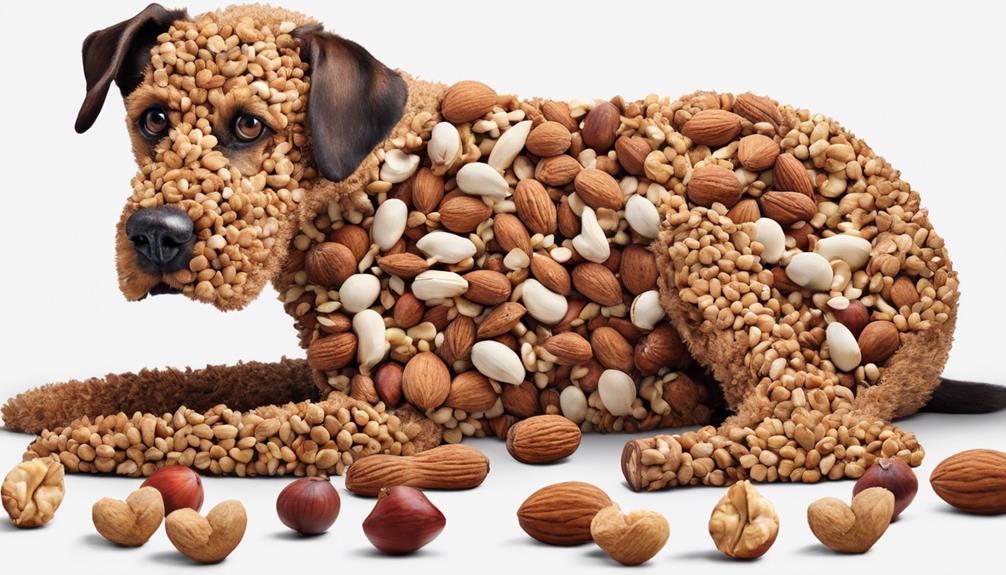When talking about dogs and their nut consumption, it can be confusing. While some nuts are safe for our furry friends to eat and enjoy, others can pose a danger. It’s important to know the dos and don’ts of feeding nuts to dogs before sharing your trail mix with them.
Stay with us to uncover the surprising truth about nuts and your canine companion's health.
Key Takeaways
- Dry roasted peanuts, raw cashews, sweet almonds, and unsalted pistachios are safe nuts for dogs in moderation.
- Hazelnuts, macadamia nuts, black walnuts, and walnuts should be avoided due to health risks.
- Dogs face risks like toxicity, pancreatitis, and gastrointestinal issues from consuming certain nuts.
- Monitor for symptoms of nut toxicity in dogs and seek immediate veterinary help if toxic nuts are ingested.
Types of Safe Nuts for Dogs
When considering types of nuts that are safe for dogs, it's important to prioritize those that are unsweetened, unsalted, and unseasoned to ensure their health and well-being.
Dry roasted peanuts are a good source of protein and nutrients for dogs, making them a safe option when given in moderation.
Raw cashews, provided they're unsalted and unseasoned, can also be beneficial due to their antioxidants and essential nutrients.
Sweet almonds, in their natural state and given sparingly, are safe for canine consumption.
Pistachios, if unsalted and unseasoned, can be considered safe but should be offered in limited quantities due to their high fat content.
These nuts, including peanuts, cashews, almonds, and pistachios, should be treated as occasional treats for dogs, ensuring that they're free of harmful additives.
It's crucial to monitor the amount given and consult with a veterinarian before introducing nuts into your dog's diet to prevent any potential health risks.
Nuts to Avoid Giving Dogs

Almonds are best avoided when feeding dogs due to their potential to cause kidney and bladder damage. While dogs may enjoy the taste of nuts, certain varieties can be harmful to their health. When considering which nuts to steer clear of giving to your furry companion, keep the following in mind:
- Hazelnuts: Pose a choking hazard and lack significant nutritional benefits for dogs.
- Macadamia Nuts: Toxic to dogs and can result in symptoms such as weakness, vomiting, and tremors.
- Black Walnuts: Contain toxins that can lead to various health issues in dogs.
- Walnuts: Particularly black walnuts, should be avoided due to potential harm and toxicity.
Being mindful of the nuts you offer your dog is essential in ensuring their well-being. Opting for safer alternatives and steering clear of harmful varieties can prevent unnecessary health complications for your canine friend.
Risks of Dogs Eating Nuts
Dogs face significant health risks when consuming nuts, including the potential for toxicity, pancreatitis, obesity, and gastrointestinal complications.
Nuts can be toxic to our canine companions, causing severe issues like pancreatitis, obesity, and gastrointestinal problems. Some nuts also pose a choking hazard or can lead to intestinal blockages in dogs, making it crucial to steer clear of them.
It's important to note that nuts with coatings containing toxic ingredients or high salt levels should be strictly avoided when it comes to our furry friends' diets. Particularly, nuts like macadamia nuts and black walnuts are highly toxic to dogs and can result in severe symptoms if ingested.
Understanding the risks associated with feeding nuts to dogs is essential for preventing potential health complications. Therefore, being mindful of the dangers nuts can pose to our canine pals is vital for their well-being and overall health.
Symptoms of Nut Toxicity in Dogs

Recognizing the symptoms of nut toxicity in dogs is crucial for prompt and effective veterinary intervention. When it comes to nut toxicity in dogs, the signs to watch out for include:
- Vomiting
- Diarrhea
- Weakness
- Tremors
- Lethargy
- Abdominal pain
- Loss of coordination
- Seizures
- Elevated heart rate
- Difficulty breathing
If your dog has ingested toxic nuts and starts showing symptoms like muscle stiffness, fever, or excessive drooling, immediate veterinary care is necessary. Monitoring your dog for any of these symptoms is essential to prevent serious health complications.
What to Do If Your Dog Eats Nuts
When a dog ingests nuts, swift action is crucial to safeguard their health and well-being. It's important to monitor your furry friend for any signs of distress or illness after consuming nuts.
If your dog has eaten toxic nuts like macadamia nuts or black walnuts, contact your veterinarian immediately. Look out for symptoms such as vomiting, diarrhea, weakness, tremors, or difficulty breathing, as these could indicate nut toxicity. Avoid inducing vomiting at home unless instructed to do so by a professional, as it can sometimes do more harm than good.
To prevent accidental consumption in the future, ensure all types of nuts are kept out of your dog's reach. Remember, a quick response and proper care are essential if your dog eats nuts. Your veterinarian is the best resource for guidance and support in such situations, so don't hesitate to reach out for help.
Frequently Asked Questions
Can Dogs Eat Nuts Safely?
We steer clear of feeding dogs nuts for their safety. High fat content and potential health risks make nuts a no-go for our furry friends. Stick to vet-approved treats to keep our pups happy and healthy.
Can Dogs Eat Cashews and Almonds?
Yes, dogs can eat cashews in moderation as they offer healthy fats and antioxidants. However, almonds should be avoided as they pose a choking hazard and may lead to kidney damage. Monitor for adverse reactions.
Which Nuts to Avoid?
We should avoid feeding dogs nuts like macadamia, almonds, hazelnuts, and walnuts. These nuts can be harmful and lead to various health issues. It's crucial to prioritize our furry friends' safety by steering clear of these dangerous options.
Can Dogs Eat Dry Roasted Nuts?
Yes, dogs can eat dry roasted nuts in moderation. Dry roasting removes excess oils and fats, making it safer for them. Avoid seasoned or salted nuts, monitor for reactions, and limit intake due to calorie content.
Conclusion
In conclusion, it's best to err on the side of caution when it comes to feeding nuts to your furry friends. While some nuts can be safe in moderation, the risks of nut toxicity in dogs are significant.
Remember, an ounce of prevention is worth a pound of cure. Stick to vet-approved treats and healthier alternatives to nuts to keep your canine companion happy and healthy for years to come.









